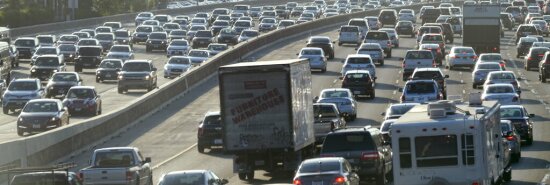
The impotence behind road rage: Cars don’t always set us free
Timothy P. Carney
Video Embed
American retiree Kenneth Darlington was apparently fed up with environmentalist protesters blocking traffic in Panama. He got out of his car, walked down the road toward them, drew his gun, and told them to move. When they didn’t, according to press reports, he opened fire, killing two of the protesters.
What’s surprising is that this hasn’t happened more often in the United States in recent years. It would be unsurprising if it does happen soon.
WHAT MANCHIN’S RETIREMENT MEANS FOR PERMITTING REFORM AND THE ENERGY COMMITTEE
Protesters block traffic for the same reason they try to ruin great works of art: Attention is what they are after, and so they figure that if they derail people’s days, they get attention. Commentators often state publicly that they would be willing to run over such protesters, which is morally about the same as shooting them.
Check some of the comments on X, the platform formerly known as Twitter. Many range from understanding Darlington’s actions to cheering them. Such commentary is common on the internet, including from folks who don’t normally advocate violence.
State legislatures have proposed and, in some cases, passed bills offering at least some protection to drivers who run over protesters.
Why do traffic-blocking protesters make us ready to kill?
Some anti-car types believe it’s about entitlement and a power trip. For many drivers, their car becomes an extension of themselves. When behind the wheel, you suddenly become large, loud, fast, and tough. Lesser, softer forms of life have to get out of your way.
I don’t think that’s the right explanation. I think drivers feel homicidal thoughts when traffic is deliberately blocked because the car can make us feel helpless.
Cars can be incredibly liberating, but they can also be prisons. Being shut inside a tiny room is not exactly a liberating feeling. More importantly, humans do not like having their physical mobility impeded. While all of us have been in frustrating human traffic jams —Christmas shopping, trying to walk out of a crowded sports stadium, etc. — car traffic jams are really the most confining situation most of us get in.
The car in stopped traffic is less free than a human in almost any circumstance. Add in that we are locked in a tiny room, and that the car separates us from the humanity of others, and yes, we feel threatened, vulnerable, and powerless in those moments.
Many observers of a certain age see Darlington as the real-life incarnation of William Foster, Michael Douglas’s character in the 1993 movie Falling Down. But notice the role that Douglas’s car plays in that film.
In the opening scene, the moment when Foster snaps is when he is stuck in his car, sitting in Los Angeles traffic. The movie is about him breaking the bonds of civilization and, in a perverse sense, liberating himself. That liberation comes when he walks away in a manner that everyone still shackled to their cars cannot.
CLICK HERE TO READ MORE FROM THE WASHINGTON EXAMINER
Protesters stopping traffic are selfish or even narcissistic. Drivers who feel rage at these protesters are often working men and women who are being kept from their jobs or families. The homicidal rage felt by these drivers, though, deserves a deeper explanation.
I believe that entitlement or power trips aren’t the right explanation. Powerlessness is.
